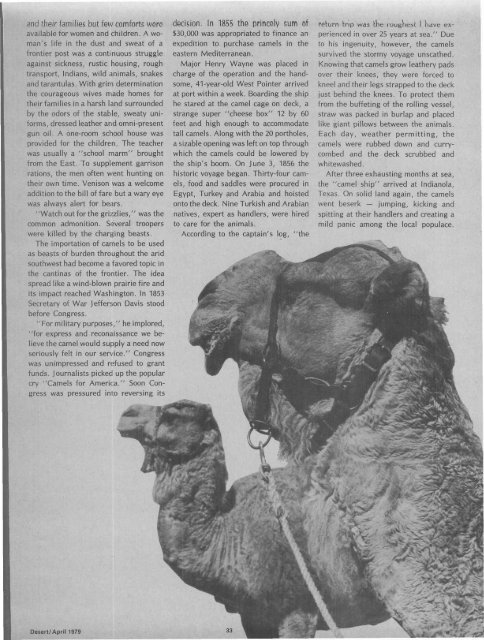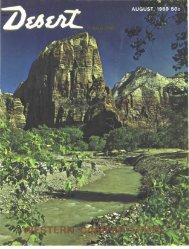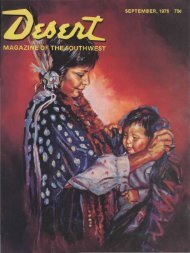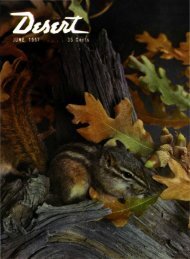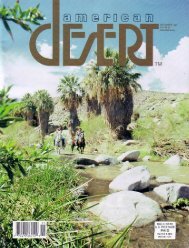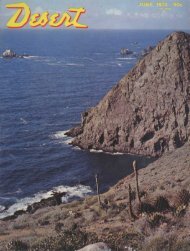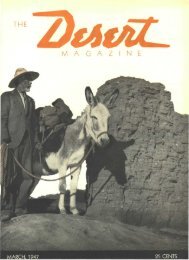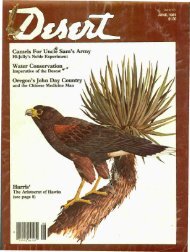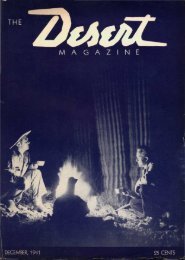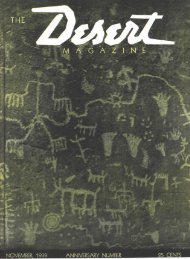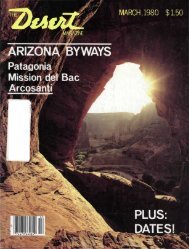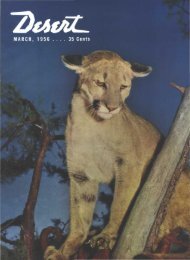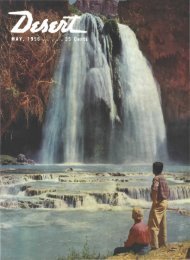Come - Desert Magazine of the Southwest
Come - Desert Magazine of the Southwest
Come - Desert Magazine of the Southwest
Create successful ePaper yourself
Turn your PDF publications into a flip-book with our unique Google optimized e-Paper software.
and <strong>the</strong>ir families but few comforts wore<br />
available for women and children. A woman's<br />
life in <strong>the</strong> dust and sweat <strong>of</strong> a<br />
frontier post was a continuous struggle<br />
against sickness, rustic housing, rough<br />
transport, Indians, wild animals, snakes<br />
and tarantulas. With grim determination<br />
<strong>the</strong> courageous wives made homes for<br />
<strong>the</strong>ir families in a harsh land surrounded<br />
by <strong>the</strong> odors <strong>of</strong> <strong>the</strong> stable, sweaty uniforms,<br />
dressed lea<strong>the</strong>r and omni-present<br />
gun oil. A one-room school house was<br />
provided for <strong>the</strong> children. The teacher<br />
was usually a "school rnarm" brought<br />
from <strong>the</strong> East. To supplement garrison<br />
rations, <strong>the</strong> men <strong>of</strong>ten went hunting on<br />
<strong>the</strong>ir own time. Venison was a welcome<br />
addition to <strong>the</strong> bill <strong>of</strong> fare but a wary eye<br />
was always alert for bears.<br />
"Watch out for <strong>the</strong> grizzlies," was <strong>the</strong><br />
common admonition. Several troopers<br />
were killed by <strong>the</strong> charging beasts.<br />
The importation <strong>of</strong> camels to be used<br />
as beasts <strong>of</strong> burden throughout <strong>the</strong> arid<br />
southwest had become a favored topic in<br />
<strong>the</strong> cantinas <strong>of</strong> <strong>the</strong> frontier. The idea<br />
spread like a wind-blown prairie fire and<br />
its impact reached Washington. In 1853<br />
Secretary <strong>of</strong> War Jefferson Davis stood<br />
before Congress.<br />
"For military purposes," he implored,<br />
"for express and reconaissance we believe<br />
<strong>the</strong> camel would supply a need now<br />
seriously felt in our service." Congress<br />
was unimpressed and refused to grant<br />
funds. Journalists picked up <strong>the</strong> popular<br />
cry "Camels for America." Soon Congress<br />
was pressured into reversing its<br />
<strong>Desert</strong>/April 1979<br />
decision. In 1855 <strong>the</strong> princely sum <strong>of</strong><br />
$30,000 was appropriated to finance an<br />
expedition to purchase camels in <strong>the</strong><br />
eastern Mediterranean.<br />
Major Henry Wayne was placed in<br />
charge <strong>of</strong> <strong>the</strong> operation and <strong>the</strong> handsome,<br />
41-year-old West Pointer arrived<br />
at port within a week. Boarding <strong>the</strong> ship<br />
he stared at <strong>the</strong> camel cage on deck, a<br />
strange super "cheese box" 12 by 60<br />
feet and high enough to accommodate<br />
tall camels. Along with <strong>the</strong> 20 portholes,<br />
a sizable opening was left on top through<br />
which <strong>the</strong> camels could be lowered by<br />
<strong>the</strong> ship's boom. On June 3, 1856 <strong>the</strong><br />
historic voyage began. Thirty-four camels,<br />
food and saddles were procured in<br />
Egypt, Turkey and Arabia and hoisted<br />
onto <strong>the</strong> deck. Nine Turkish and Arabian<br />
natives, expert as handlers, were hired<br />
to care for <strong>the</strong> animals.<br />
According to <strong>the</strong> captain's log, "<strong>the</strong><br />
33<br />
return trip was <strong>the</strong> roughest ) lidve experienced<br />
in over 25 years at sea." Due<br />
to his ingenuity, however, <strong>the</strong> camels<br />
survived <strong>the</strong> stormy voyage unsca<strong>the</strong>d.<br />
Knowing that camels grow lea<strong>the</strong>ry pads<br />
over <strong>the</strong>ir knees, <strong>the</strong>y were forced to<br />
kneel and <strong>the</strong>ir legs strapped to <strong>the</strong> deck<br />
just behind <strong>the</strong> knees. To protect <strong>the</strong>m<br />
from <strong>the</strong> buffeting <strong>of</strong> <strong>the</strong> rolling vessel,<br />
straw was packed in burlap and placed<br />
like giant pillows between <strong>the</strong> animals.<br />
Each day, wea<strong>the</strong>r permitting, <strong>the</strong><br />
camels were rubbed down and currycombed<br />
and <strong>the</strong> deck scrubbed and<br />
whitewashed.<br />
After three exhausting months at sea,<br />
<strong>the</strong> "camel ship" arrived at Indianola,<br />
Texas. On solid land again, <strong>the</strong> camels<br />
went beserk — jumping, kicking and<br />
spitting at <strong>the</strong>ir handlers and creating a<br />
mild panic among <strong>the</strong> local populace.<br />
fj0>**$


